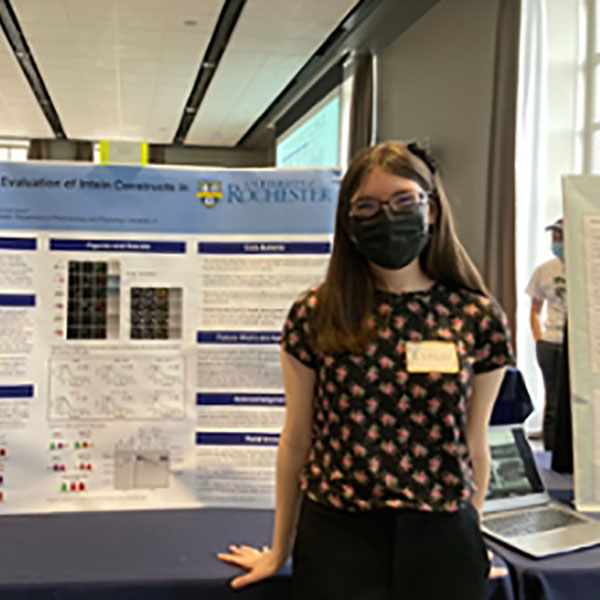Featured Researcher: Loren Cardani '23
About the Student Researcher

Major(s) and minor(s)
Biochemistry major (BS); Chemistry and Latin American Studies minors; School of Arts and Sciences
What's your research story?
My first research experience was at URMC in the department of Pharmacology and Physiology. I was studying certain neural receptors and how they behave alongside different associated proteins. This was a pretty small lab, so I got a lot of hands-on experience in biological techniques. I also spent a summer at URMC with a Discover Grant to study self-splicing proteins as a potential tool to force our receptors to form heterodimeric pairs. I loved this work, because it had tangible biological impacts, and it helped me confirm my desire to include biology in my future research.
However, I am also very passionate about chemistry! I joined the Nilsson Lab in my junior fall, where I focused on studying peptide self-assembly. Some peptides can interact with each other and extend along an axis to form supramolecular fibrils and other structures, and we were interested in seeing if these assemblies could have an impact in medicine. My current project involves attaching other proteins or molecules to these fibrils, thus preventing diffusion and providing localized activity. I'm also interested in seeing how sequence affects the way peptides assemble!
Finally, this past summer, I took part in an REU program at NYU. There, I designed molecules called peptoids that mimic peptides and can interfere in protein-protein or protein-DNA interactions. My project involved establishing a structure-activity relationship that determined the ability of a given peptoid to inhibit a certain pathway in Type 1 Diabetes. I also investigated the limits to peptoid synthesis, and potentially found a cheaper and easier way to synthesize our original hit drug molecule. This experience taught me a lot about chemical biology!
Now, I know that I want to pursue a PhD at the interface of biology and chemistry in order to pursue my many interests and involve the skills I've learned. Eventually, I would like to assume a teaching role where I can help to make communication accessible for students from all backgrounds. I'm so excited to pursue this goal through continued community involvement, TAing, and tutoring – teaching and learning from others brings me a lot of joy!
How did you initially secure your research position?
I got my first research position by cold-emailing the PI. We chatted over Zoom, I visited the lab, and I joined the next week.
I became a member of my current lab by chatting with the PI, who taught the graduate chemistry class I was in. The class material was very interesting and seemed to relate to his lab's research, so he told me a little more about his lab in a subsequent meeting and we both thought it would be a good fit!
Departments/programs of research
Kammermeier Lab, URMC Dept. of Pharmacology and Physiology
Nilsson Lab, UR Dept. of Chemistry
Kirshenbaum Lab, NYU Dept. of Chemistry
Has your research experience enabled you to qualify for/apply to other awards or scholarships?
I applied for DAAD RISE, Fulbright, NSF GRFP, Goldwater, de Kiewiet, Astronaut, and NSF REU. Out of those, I received an NSF REU and an Astronaut Scholarship and was offered a de Kiewiet Summer Research Fellowship.
Any research presentations, awards, or publications?
I presented at the Astronaut Scholar Technical Conference in Orlando, FL!
Can you share some "lessons learned" as a result of your undergraduate research experience?
I learned that it's always okay to ask questions! The labs that I have been part of are incredibly supportive and encourage curiosity from all of their students. I have become a much better researcher because I learned to look for underlying concepts in the protocols that I was following and clarified things I was confused about. Eventually, this resulted in a deeper understanding of the work, which allowed me to train other students and propose my own experiments. Without this willingness (and support) to ask questions, I wouldn't have gotten nearly as much out of the experience!
What advice can you share with new undergraduate researchers?
Try things. Don't worry if you're not completely qualified for something, and don't underestimate the power of a good work ethic and an eagerness to learn. No lab expects a flawless, all-knowing undergraduate to seamlessly integrate into the group and make zero mistakes. Every great scientist has to start somewhere, so focus on the progress and the journey. You've got this!
